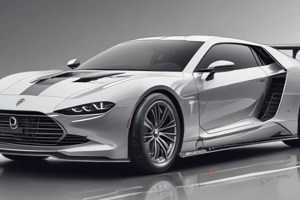Podcast
Questions and Answers
What is the function of the fuel injectors in an internal combustion engine?
What is the function of the fuel injectors in an internal combustion engine?
- To pump the fuel from the fuel tank to the engine
- To remove impurities and contaminants from the fuel
- To store the fuel used by the engine
- To introduce fuel into the engine's cylinders (correct)
Where is the fuel tank usually located in a vehicle?
Where is the fuel tank usually located in a vehicle?
- Underneath the driver's seat
- In the front of the vehicle
- In the rear of the vehicle (correct)
- On top of the engine
What is the primary responsibility of the fuel pump in an internal combustion engine?
What is the primary responsibility of the fuel pump in an internal combustion engine?
- To store the fuel used by the engine
- To introduce fuel into the engine's cylinders
- To pump the fuel from the fuel tank to the engine (correct)
- To remove impurities and contaminants from the fuel
What does the fuel filter do in an internal combustion engine?
What does the fuel filter do in an internal combustion engine?
What is the function of the fuel pressure regulator?
What is the function of the fuel pressure regulator?
Where is the battery pack usually located in electric engines?
Where is the battery pack usually located in electric engines?
What is the primary difference between the fuel system of internal combustion engines and that of electric engines?
What is the primary difference between the fuel system of internal combustion engines and that of electric engines?
What is responsible for recharging the battery pack in electric engines when the vehicle is not in use?
What is responsible for recharging the battery pack in electric engines when the vehicle is not in use?
What components are part of the fuel system for hybrid engines?
What components are part of the fuel system for hybrid engines?
What is the main function of the charging system for hybrid engines?
What is the main function of the charging system for hybrid engines?
What type of hydraulic pump uses vanes that rotate inside a cylindrical chamber to pump fluid?
What type of hydraulic pump uses vanes that rotate inside a cylindrical chamber to pump fluid?
Which type of hydraulic pump uses a pair of intermeshing gears to move fluid from the inlet to the outlet?
Which type of hydraulic pump uses a pair of intermeshing gears to move fluid from the inlet to the outlet?
What is the primary difference between Ram Pumps and other types of hydraulic pumps?
What is the primary difference between Ram Pumps and other types of hydraulic pumps?
Which type of hydraulic pump uses a piston to transfer fluid from the inlet to the outlet?
Which type of hydraulic pump uses a piston to transfer fluid from the inlet to the outlet?
What is the main function of hydraulic pumps?
What is the main function of hydraulic pumps?
Where does the hydraulic fluid go after being drawn into the pump's inlet?
Where does the hydraulic fluid go after being drawn into the pump's inlet?
What is a common application of hydraulic pumps in the transportation industry?
What is a common application of hydraulic pumps in the transportation industry?
Why is regular maintenance crucial for hydraulic pumps?
Why is regular maintenance crucial for hydraulic pumps?
What is an essential skill for working with hydraulic pumps?
What is an essential skill for working with hydraulic pumps?
How do hydraulic pumps contribute to the construction industry?
How do hydraulic pumps contribute to the construction industry?
Flashcards
What is an engine?
What is an engine?
The heart of a vehicle responsible for providing it with the power to move.
What are internal combustion engines?
What are internal combustion engines?
They're the most common engine type, they burn fuel to create energy.
What is a fuel tank?
What is a fuel tank?
This component stores the fuel that powers the engine. It's usually located in the back of the vehicle.
What is a fuel pump?
What is a fuel pump?
Signup and view all the flashcards
What is a fuel filter?
What is a fuel filter?
Signup and view all the flashcards
What are fuel injectors?
What are fuel injectors?
Signup and view all the flashcards
What is a fuel pressure regulator?
What is a fuel pressure regulator?
Signup and view all the flashcards
What are electric engines?
What are electric engines?
Signup and view all the flashcards
What is a battery pack?
What is a battery pack?
Signup and view all the flashcards
What is a charging system?
What is a charging system?
Signup and view all the flashcards
What are hybrid engines?
What are hybrid engines?
Signup and view all the flashcards
What is the fuel system in hybrid cars?
What is the fuel system in hybrid cars?
Signup and view all the flashcards
What is the battery pack used for in hybrid cars?
What is the battery pack used for in hybrid cars?
Signup and view all the flashcards
What is the charging system used for in hybrid cars?
What is the charging system used for in hybrid cars?
Signup and view all the flashcards
What are fuel systems?
What are fuel systems?
Signup and view all the flashcards
What are the fuel systems like in different engine types?
What are the fuel systems like in different engine types?
Signup and view all the flashcards
Why is understanding fuel systems important?
Why is understanding fuel systems important?
Signup and view all the flashcards
Study Notes
Engine: The Heart of the Vehicle
An engine is the heart of a vehicle, providing the power needed to move it. There are various types of engines, including internal combustion engines, electric engines, and hybrid engines. Each type has its own unique fuel system that plays a crucial role in the engine's performance. In this article, we will explore the fuel systems of different engine types, focusing on internal combustion engines, electric engines, and hybrid engines.
Internal Combustion Engine Fuel Systems
Internal combustion engines rely on a fuel system to deliver fuel to the engine's cylinders. The fuel system consists of several components, including the fuel tank, fuel pump, fuel filter, fuel injectors, and fuel pressure regulator.
-
Fuel Tank: The fuel tank stores the fuel used by the engine. It is usually located in the rear of the vehicle and is made of a durable material like steel or aluminum.
-
Fuel Pump: The fuel pump is responsible for pumping the fuel from the fuel tank to the engine. It is usually located near the fuel tank and is activated when the engine is started.
-
Fuel Filter: The fuel filter is used to remove impurities and contaminants from the fuel before it reaches the engine. This helps to prevent damage to the engine and maintain its performance.
-
Fuel Injectors: Fuel injectors are used to introduce fuel into the engine's cylinders. They are usually located near the intake manifold and are activated by the engine's control system.
-
Fuel Pressure Regulator: The fuel pressure regulator maintains the proper pressure of the fuel in the fuel system. This helps to ensure that the engine receives a consistent supply of fuel.
Electric Engine Fuel Systems
Electric engines do not use fuel in the same way as internal combustion engines. Instead, they rely on an electrical power source, such as a battery pack, to power the engine. The fuel system for electric engines consists of the battery pack and the charging system.
-
Battery Pack: The battery pack stores the electrical energy used by the electric engine. It is usually located in the vehicle's chassis or under the floor.
-
Charging System: The charging system is responsible for recharging the battery pack when the vehicle is not in use. It is usually located near the engine and is activated when the engine is started.
Hybrid Engine Fuel Systems
Hybrid engines combine the benefits of both internal combustion engines and electric engines. They use a fuel system similar to that of internal combustion engines, as well as an electrical power source, such as a battery pack, to power the electric engine.
-
Fuel System: The fuel system for hybrid engines is similar to that of internal combustion engines, with components such as the fuel tank, fuel pump, fuel filter, fuel injectors, and fuel pressure regulator.
-
Battery Pack: The battery pack stores the electrical energy used by the electric engine. It is usually located in the vehicle's chassis or under the floor.
-
Charging System: The charging system is responsible for recharging the battery pack when the vehicle is not in use. It is usually located near the engine and is activated when the engine is started.
In conclusion, the fuel system is a crucial component of an engine, ensuring that it receives the necessary fuel or electrical energy to function properly. Whether it's an internal combustion engine, electric engine, or hybrid engine, each engine type has its own unique fuel system designed to optimize its performance. Understanding these fuel systems can help you maintain your vehicle and ensure that it runs smoothly and efficiently.
Studying That Suits You
Use AI to generate personalized quizzes and flashcards to suit your learning preferences.




